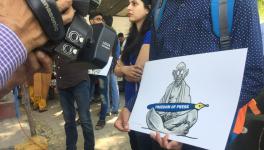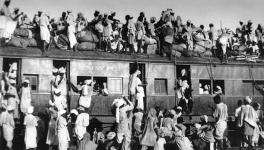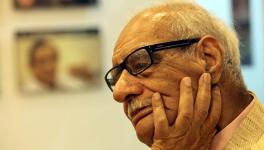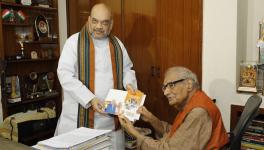Kuldip Nayar – A Crusader for Peace
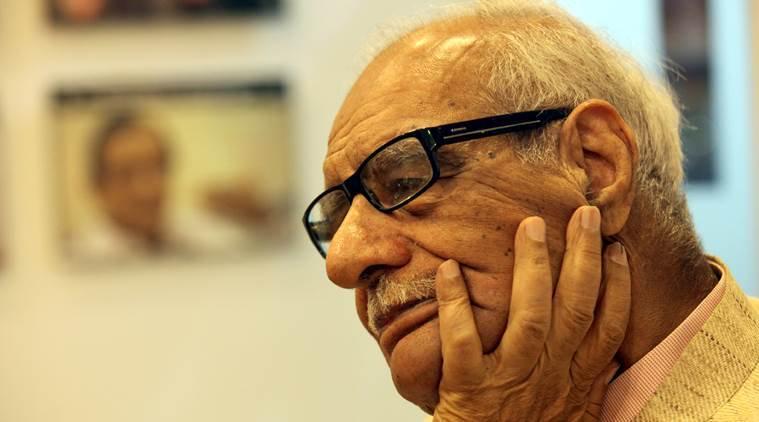
Kuldip Nayar – journalist par excellence, editor, human rights activist and a harbinger of peace in the Indian subcontinent passed away in the early hours of August 23. His cremation was attended by hundreds of his admirers: journalists, activists, politicians and members of the judiciary – several of whom broke into tears while paying their last tribute to a man who stood for the values of peace, secularism and fraternity to the last.
Nayar was born in Sialkot, Punjab in undivided India to Gurbaksh Singh and Puran Devi and at 16 years of age, was present when the resolution for Pakistan was passed in Lahore which he did not take seriously, for ‘how could a mere resolution tear apart the Hindus and Muslims who had lived together for over a thousand years.’ He was a reluctant sibling who was selected by a draw of lots to cross the border with an army Major and witnessed the loot and barbarism that was unleashed in the Indian subcontinent. At a railway station, Nayar was nearly killed, but saved by the intervention of a bystander. His parents were saved at the Sialkot railway station, by a young Muslim who recognised them. The Partition influenced him for life, for he remained a relentless crusader for peace in the Indian subcontinent, lighting candles on the Wagah border on the eve of Independence Day, and tirelessly standing up for inter-faith harmony, brotherhood between communities and secularism.
Having lost everything during the Partition, Nayar started humbly at an Urdu newspaper Anjam. He covered the assassination of Mahatma Gandhi, and later wrote, ‘the extremist Hindus found him in the way of their design to set up a Hindu state. They conspired and one of them shot him dead on 30 January 1948’. However, he was dismissed from his job, as he failed to recover the property of the brother of the proprietor, and later left to study at the Medill School of Journalism, Northwestern University, on a scholarship. There, he said, “I washed windows and served at the cafeteria. However that was not enough and a journalist Norman Cousins gave $ 150 for my tuition. When I left for India, I thanked him.”
On returning to India, he could not find an opening in any English newspaper, but he always believed ‘optimism is a moral duty’ and published an article ‘To Every Thinking Refugee’ through Humayun Kabir’s feature agency. Married to Bharti, daughter of freedom fighter, Bhimsen Sachar, he then joined Govind Ballabh Pant as an Information officer, and then served then PM Lal Bahadur Shastri. Here, he was privy to the secrets of the state, but he always maintained that Shastri had an impeccable record in honesty, humility and integrity. After Shastri’s untimely death, he headed the UNI (United News of India) and then joined the prestigious English newspaper, The Statesman as the editor.
When the emergency was declared, my late father, Viren Chhabra, his former colleague at The Statesman, had dinner with Nayar at his house. On leaving, he saw a policeman pretending to read a newspaper in the dark. When he called to warn him in the morning, and he was informed by Nayar’s wife, Bharti: ‘After you left, they came.’ Nayar was then editor of The Indian Express, and the Emergency which he referred to as ‘India’s darkest hour’, undoubtedly brought out Nayar’s finest spirit. He recalled how in jail he ‘took out flies from a watery dal and lost seven kilos of weight’, and could only meet his son Rajiv and wife over a brief ‘mulakati’. On his release, he became a relentless crusader for the freedom of press, democracy and human rights.
Nayar however had to resign due to differences with the proprietor. He said, “I could never find another job in journalism,” but he kept on writing becoming a star syndicated columnist, a man whose words and insights carried weight about the birth and emergence of three countries – India, Pakistan and Bangladesh – internationally. His column was printed in 80 newspapers in 14 languages in India and abroad. He later became High commissioner to UK, and a nominated member of the Rajya Sabha.
Nayar, however, cannot be categorised as only a journalist, as he believed in ethical action. He spearheaded the PUCL (People’s Union of Civil Liberties) and CFD (Citizens for Democracy), and went for many fact-findings. He was known for his open spirit and sense of solidarity for causes. Despite his age, he would go to the Narmada valley, and find common cause with the people who had been displaced, he would be seen lighting a candle for the Burmese people during the military oppression and at peoples’ gathering for the poor and the marginalised. He was a familiar sight at Jantar Mantar where he and his brother-in-law, Rajindar Sachar, were known to be indefatigable.
Nayar wrote, “When I crossed the border on September 13, 1947, I had seen so much blood and destruction in the name of religion that I vowed that the new India which we were going to build would know no deaths due to differences in religion and caste.” Sadly, the resurgence of communalism proved him wrong, but Nayar kept on urging the young to stand up for secularism and peace. He did not practice hierarchy. He would cross a foyer to wish someone years his junior and sit on a dirty street-side on a dharna – expressing solidarity with the poor and the marginalised. He was always full of encouragement, exhorting all of us to work for the poor and the cause of secularism. In fact, on a Doordarshan interview, at age 93, I called him the ‘youngest person I know, in spirit and heart’. “How do you do it?” I asked. “I have seen Partition,” he replied, simply.
When I wished him on his birthday on August 14, he promised me the last round of our archival recordings, and as he entered hospital shortly after, it never happened. I visited him at the hospital where his spirit was admirable, but age was against him. However, to those of us who had the fortune of engaging with him, his luminous spirit will shine on forever.
(Chhabra is an author and a filmmaker.)
Get the latest reports & analysis with people's perspective on Protests, movements & deep analytical videos, discussions of the current affairs in your Telegram app. Subscribe to NewsClick's Telegram channel & get Real-Time updates on stories, as they get published on our website.









